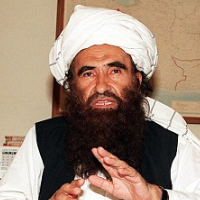Obama Administration Discovers that Vicious Terrorist Group is a Vicious Terrorist Group
 Jalaluddin Haqqani (photo: EPA)
Jalaluddin Haqqani (photo: EPA)
A militant Islamist group based in the remote regions of the Afghanistan-Pakistan border and led by a former minister in the Taliban government is, according to U.S. military commanders, “the most resilient enemy network” and one of the biggest threats to the U.S. military and the Afghan government in the war in Afghanistan. Active since the late 1980s, the group has been involved in numerous attacks, including the July 2008 bombing of the Indian embassy in Kabul, the December 2009 Camp Chapman attack, and the September 12, 2011, attack on the US Embassy and nearby NATO bases in Kabul.
Nonetheless, the group, known as the Haqqani Network after its founder and leader, Jalalludin Haqqani, has not been officially designated as a terrorist group by the U.S. government. A spirited debate within the Obama administration over the issue will come to a head in the next week, as Secretary of State Hillary Clinton is required by a law passed in August either to designate the network as a terrorist group or explain to Congress why it is not.
Aside from embarrassment regarding the Haqqani Network’s origins (like the Taliban and Osama bin Laden’s al-Qaeda, the Haqqani Network emerged during the Soviet war in Afghanistan [1979-1989] with substantial U.S. assistance), opponents of a terrorist designation cite several reasons for their position.
Primarily, they argue that because significant elements within the Pakistani military and intelligence services either sympathize with or support the Haqqanis, a terrorist designation would further strain already tense relations with Pakistan. Some U.S. officials say the Pakistani military is covertly aiding the Haqqanis, a charge Pakistan denies even as it admits that Pakistani military intelligence maintains regular contact with them. The U.S. military relies heavily on vital supply lines running from Pakistan into Afghanistan.
Additionally, opponents of a terrorist designation point out that the practical advantages of such a designation—mainly drying up fundraising—could be achieved by other, less provocative means. They also fear that such a move would ruin hopes that the end of this year’s Afghan fighting season will bring the Taliban back to peace talks, and kill any chances of negotiating a prisoner exchange to effect the release of Sgt. Bowe Bergdahl, the only U.S. service member being held by the Haqqanis.
Regardless of the terrorist group designation, which appears increasingly likely, military action against the Haqqani Network will continue. U.S. officials confirmed last week that Badruddin Haqqani, the network’s operational commander, was killed in a drone strike in Pakistan.
-Matt Bewig
To Learn More:
U.S. Seems Set to Brand Militant Group as “Terrorist” (by Eric Schmitt, New York Times)
Obama Administration Divided over Designating Haqqani Network as Terrorist Group (by Karen DeYoung, Washington Post)
U.S. Attacks in Pakistan Reach Record Levels (by David Wallechinsky and Noel Brinkerhoff, AllGov)
Who Are the Enemies U.S. is Bombing in Pakistan? (by Noel Brinkerhoff, AllGov)
- Top Stories
- Unusual News
- Where is the Money Going?
- Controversies
- U.S. and the World
- Appointments and Resignations
- Latest News
- Musk and Trump Fire Members of Congress
- Trump Calls for Violent Street Demonstrations Against Himself
- Trump Changes Name of Republican Party
- The 2024 Election By the Numbers
- Bashar al-Assad—The Fall of a Rabid AntiSemite






Comments